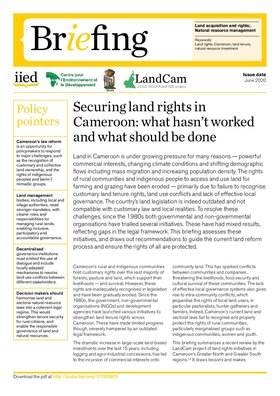The laws in the Republic of Congo and the Central African Republic provide limited protection to indigenous peoples and local communities regarding access to land and forest resources. Often, logging concessions overlap their territories, restricting access to lands and resources. However, the development of community forests is gaining momentum in the region. These can help secure customary tenure, sustainably manage resources and improve livelihoods for indigenous peoples and local communities (IPLCs).
Search results
Showing items 1 through 9 of 30.-
Library ResourcePolicy Papers & BriefsSeptember, 2019Central African Republic
-
Library Resource
WRM Bulletin 254 – Jan/Feb 2021
Policy Papers & BriefsJanuary, 2021Mozambique, Cameroon, Democratic Republic of the Congo, Gabon, Liberia, Nigeria, Brazil, Ecuador, Venezuela, Indonesia, Malaysia, ThailandThe articles in this Bulletin are written by the following organizations and individuals: National Coordinator for the Defense of the Mangrove Ecosystem (C-CONDEM), Ecuador; Yayasan Pusaka Bentala Rakya (Bentala Raya Heritage Foundation), Indonesia; Venezuelan Observatory of Political Ecology and members of the WRM international secretariat in close collaboration with several allies who are part of grassroots groups in different countries.
-
Library ResourceReports & ResearchMarch, 2017Central African Republic, Norway
Issues swirling around land across Africa have never been so central to key social and political-economic dynamics as they are at the present time. The first part of the paper briefly reviews the construction of customary tenure and the historical phases of administrative interventions into land tenure, and considers their heritage in contemporary situations.
-
Library ResourceReports & ResearchMarch, 2016Central African Republic, Mozambique
This research is conducted to contribute to the currently ongoing policy debate on the benefits of collective vis-à-vis individual land tenure rights. The paper attempts to explore the Mozambican community land delimitation (CLD) program based on a community-level survey conducted in mid-September 2014. The survey revealed that land conflict is the main reason to initiate a CLD process, and nongovernmental organizations (NGOs) are major players in initiating and helping the CLD process.
-
Library ResourceJournal Articles & BooksDecember, 2019South Africa, Africa, Western Africa, Eastern Africa, Middle Africa, Southern Africa, Sub-Saharan Africa
This paper examines the intersections between youth access to land, migration decisions and employment opportunities using nationally representative and multi-year data from multiple African countries. We document evidence on the evolving dynamics in land distribution and ownership patterns, the effect of land access on youth livelihood choices and development of rental and sales market in the region.
-
Library ResourceJournal Articles & BooksDecember, 2019Africa, Sub-Saharan Africa, Eastern Africa, Middle Africa, Southern Africa, South Africa, Western Africa
A narrative on rural youth in Africa has continued to evolve in policy circles around the world. Much of it is driven by population statistics that point to an imminent youth bulge in Africa and concerns about a poor economic outlook (stagnation) for African productivity and growth. Fears of massive unemployment, social unrest and undesirable migration due to limited economic growth drive the bulk of the discourse. This is juxtaposed with the promise of a youth dividend for the continent, which is highlighted by some quarters of the policy debate.
-
Library ResourcePolicy Papers & BriefsJune, 2020Cameroon
Land in Cameroon is under growing pressure for many reasons — powerful commercial interests, changing climate conditions and shifting demographic flows including mass migration and increasing population density. The rights of rural communities and indigenous people to access and use land for farming and grazing have been eroded — primarily due to failure to recognise customary land tenure rights, land use conflicts and lack of effective local governance. The country’s land legislation is indeed outdated and not compatible with customary law and local realities.
-
Library Resource
Vol 2, No 3: September 2019
Peer-reviewed publicationSeptember, 2019Central African RepublicScaling up promotion of land rights and improved access to land for the poor, women and other vulnerable groups has been at the core of the global land community’s agenda. The pro-poor land recordation tool (PPLRT) offers an alternative approach to both conventional and emergent responsible land tools, which can be implemented on its own and in combination with other tools. It has recently been tested for various types of rural contexts.
-
Library Resource
Land Use Policy Volume 81
Peer-reviewed publicationFebruary, 2019Central African RepublicMost of the land in sub-Saharan Africa is governed under various forms of customary tenure. Over the past three decades a quiet paradigm shift has been taking place transforming the way such landl is governed. Driven in part by adaptations to changing context but also accelerated by neo-liberal reforms, this shift has created a ‘new’ customary tenure in sub-Saharan Africa. This paper reviews some of the evidence and analyses the ways in which this neo-liberalisation of customary tenure has been transforming relations of production and how land is governed in sub-Saharan Africa.
-
Library ResourceReports & ResearchDecember, 2017Central African Republic, Asia
Irrigation can help to improve and stabilise agricultural productivity, thereby contributing to food security and to resilience against climate change. Irrigation – either full or supplementary – reduces reliance on erratic rainfall/droughts and increases yields; it extends cropping periods and cycles, allows the cultivation of a broader spectrum of crops, and provides stable conditions for applying further yield-increasing means (fertilizers). Irrigation also encourages farmers to invest, on the one hand, and financial institutions to provide credits, on the other.
Land Library Search
Through our robust search engine, you can search for any item of the over 64,800 highly curated resources in the Land Library.
If you would like to find an overview of what is possible, feel free to peruse the Search Guide.






